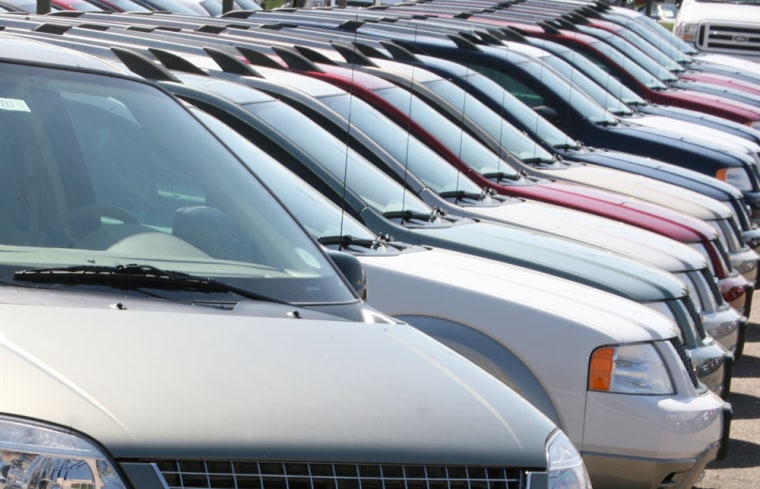For the first time last month, an American auto buyer was more likely to get behind the wheel of a new Toyota than a new Ford.
It’s hard to read anything into one month’s numbers, and Ford Motor Co.’s year-to-date sales are still ahead of its Japanese competitor’s. But the shift seems to symbolize the recent stumbles of U.S. automakers in the face of rising gas prices and changing views on fuel economy.
Ford, along with General Motors Corp. and DaimlerChrysler AG’s Chrysler Group, is heavily dependent on sales of high-margin sport utility vehicles and other trucks — products that have become less popular lately, as gas prices in most of the country are stuck around $3 a gallon.
All three domestic producers saw double-digit sales declines in July, with the worst decreases in trucks. They blamed the drop on heavy incentives last summer that artificially elevated sales then.
Meanwhile, Toyota Motor Corp. and Honda Motor Co. saw substantial increases, which they attributed to their reputations for fuel efficiency.
Overall, 1.49 million vehicles were sold last month, a 17.4 percent decrease from July 2005. The seasonally adjusted sales rate, which shows what total sales would be if they remained at the same rate for the entire year, was 17.24 million, according to Autodata Corp. Automakers sold 17 million vehicles in 2005.
GM, the world’s largest automaker, said its sales fell 22.2 percent, with trucks falling 31.2 percent and cars inching down 2.7 percent.
At Ford, sales of Ford, Lincoln and Mercury vehicles fell 35.2 percent. Truck sales plummeted 44.8 percent, while cars slipped 6.7 percent. Sales of F-Series pickup trucks, long the country’s best-selling vehicle and the company’s most important vehicle, shot down 45.6 percent.
DaimlerChrysler’s Chrysler Group said its sales fell 37.4 percent, with truck sales off 40 percent and car sales off 23.5 percent. That change happened despite the fact that Chrysler, alone among automakers, has revived the employee price promotion that fueled sales last year.
Chrysler announced Tuesday that it would extend the discount program through August. Company officials said the promotion was helping, though not as much as last year, when all three domestic automakers were doing it and each benefited from the advertising of the others.
Toyota’s sales, meanwhile, soared 11.7 percent, with cars jumping 19.8 percent and trucks up 1.3 percent.
The company outsold Ford by more than 17,000 vehicles. Autodata Vice President David Lucas said it was the first time Toyota had sold more vehicles than Ford in a given month.
Toyota spokesman Mike Michels cautioned not to read much into the numbers. “One month does not make any particular trend,” he said.
Jim Lentz, executive vice president of Toyota’s U.S. division, said market conditions were “playing to traditional Toyota strengths of fuel efficiency, strong passenger car offerings as well as our comprehensive hybrid lineup.”
Honda said its July sales rose 6 percent, with cars up 5.4 percent and trucks up 6.8 percent. The company said it was unable to keep up with demand for its small cars.
Nissan Motor Co. said it sold 19.5 percent fewer vehicles. That included a 24.9 percent decrease in trucks and a 14.5 percent decrease in cars. Nissan has not introduced new models yet this year.
Officials at Ford and GM said they had expected their sales to be way off because of last year’s promotions.
“What goes around comes around,” said Ford sales analyst George Pipas.
However, Pipas predicted the year-over-year comparison would be more even by December. Last year, sales fell off in the fall because of what the industry calls “payback,” following a period of big discounts.
Paul Taylor, chief economist of the National Automobile Dealers Association, also predicted sales would pick up in the fall. He said automakers would likely boost incentives in the coming months to clear out old inventory.
Taylor said he expects total 2006 sales of 16.8 million vehicles.
For the first seven months of the year, Ford’s sales fell 9.7 percent, GM’s sales were down 14.1 percent, and Chrysler’s sales fell 10.4 percent. Toyota’s and Honda’s sales rose 10.1 percent and 6.9 percent, respectively, while Nissan’s fell 7.9 percent.
GM shares fell 93 cents, or nearly 3 percent, to close at $31.30 on the New York Stock Exchange. Ford shares fell 9 cents to $6.58, while DaimlerChrysler’s U.S. shares fell 61 cents to $51.04.
